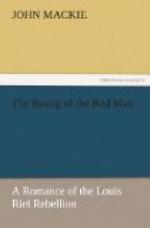“The master is good,” he said. “Child-of-Light still remembers how in that bad winter so many years ago, when the cotton-tails and rabbits had died from the disease that takes them in the throat, and the wild animals that live upon them died also because there was nought to eat, and how when disease and famine tapped at the buffalo robe that screens the doorways of the tepees, he who is the brother of the white man and the red man had compassion and filled the hungry mouths.”
“Ah, well, that’s all right, Child-of-Light,” lightly said Douglas, wondering what the chief had come to say. He understood the red man’s ways, and knew he would learn all in good time.
But the chief would not eat or drink. He would, however, smoke, and helped himself from the pouch that Douglas offered. He let his blanket fall from his shoulders, and underneath there showed a richly-wrought shirt of true barbaric grandeur. On a groundwork of crimson flannel was wrought a rare and striking mosaic in beads of blue and yellow and red. The sun glowed from his breast, countless showy ermine tails dangled from his shoulders, his arms and his sides like a gorgeous fringe, and numerous tiny bells tinkled all over him as he moved. His features were large and marked, his forehead, high, and his nose aquiline. His Mongolian set eyes were dark and full of intellect, his expression a strange mixture of alertness, conscious power, and dignity. He was a splendid specimen of humanity.
He filled his pipe leisurely, then spoke as if he hardly expected that what he had to say would interest his hearers.
The half-breeds, led by Louis Riel and Gabriel Dumont, had risen, he said, and large numbers of the Indians had joined them. Before twenty-four hours there would hardly be a farmstead or ranche in Saskatchewan that would not be pillaged and burnt to the ground. He, Child-of-Light, had managed to keep his band in check, but there were thousands of Indians in the country, Crees, Salteaus, Chippeywans, Blackfoot, Bloods, Piegans, Sarcees, renegade Siouxs, and Crows who would join the rebels. Colonel Irvine, of the North-West Mounted Police at Fort Carlton, had already destroyed all the stores, and, having set fire to the buildings, was retreating on the main body.
Douglas the rancher had “sat quietly while the chief told his alarming news. He hardly dared look at his daughter.
“I have been a fool!” he said bitterly. “I have tried to hide the truth from myself, and now it may be too late. Of course it’s not the stock and place I’m thinking about, Dorothy, but it’s you—I had no right—–”
“Oh, hush, dad!” cried the girl, who seemed the least concerned of any. “I don’t believe the rebels will interfere with us. Besides, have we not our friend, Child-of-Light?”
“The daughter of my brother Douglas is as my own child,” said the chief simply, “and her life I will put before mine. But Indians on the war-path are as the We’h-ti-koo, [Footnote: Indians of unsound mind who become cannibals.] who are possessed of devils, whose onward rush is as the waters of the mighty Saskatchewan river when it has forced the ice jam.”




